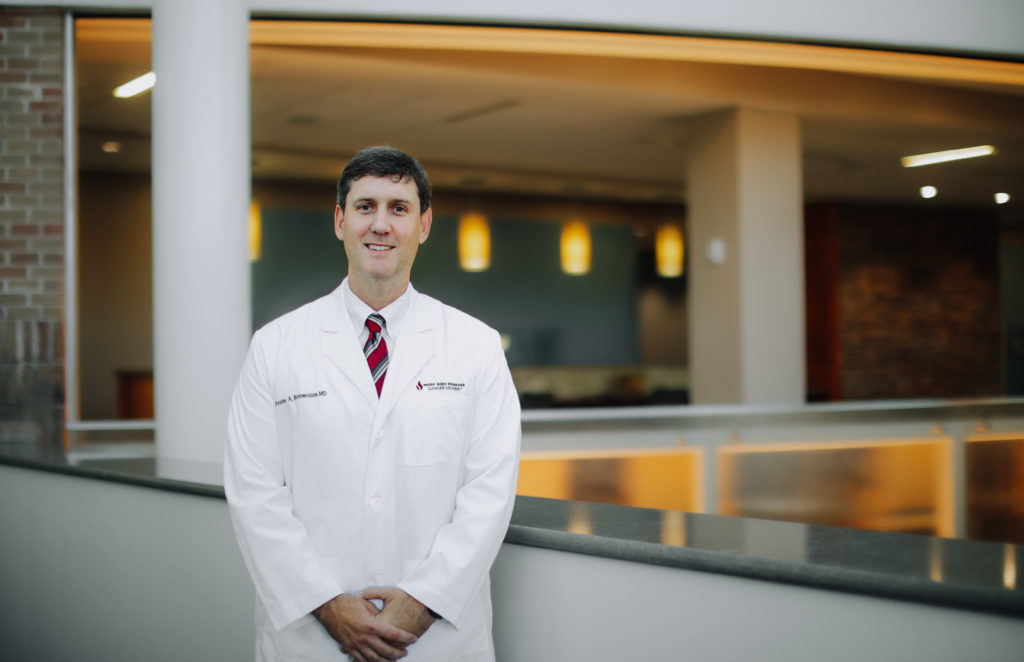 The words “palliative care” can strike fear in patients facing serious illnesses, but there’s a lot more to this field of medicine than you might think, says Andre Bonnecaze, MD, director of Mary Bird Perkins Cancer Center’s recently opened Riley-Billings Supportive and Palliative Care Clinic.
The words “palliative care” can strike fear in patients facing serious illnesses, but there’s a lot more to this field of medicine than you might think, says Andre Bonnecaze, MD, director of Mary Bird Perkins Cancer Center’s recently opened Riley-Billings Supportive and Palliative Care Clinic.
The dedicated clinic was established in 2022 to help patients live better through cancer treatment by addressing the pain and discomfort associated with treatment, and supporting patients’ emotional, physical and spiritual needs as they undergo the cancer journey.
“Palliative medicine is a specialty of medicine that focuses on improving quality of life in patients who are dealing with cancer or other forms of serious illness,” Bonnecaze said. “We really aim to alleviate the symptoms and burdens of the disease, whether it’s cancer-related pain, nausea, loss of appetite, anxiety or other issues that can result from cancer or cancer treatment.”
Bonnecaze and his team deploy a multitude of strategies to support a patient’s needs, including pain management, counseling, nutrition support and management of the various side effects that can result from treatment protocols.
“If we do a really good job of treating symptoms, a patient’s quality of life and outlook is going to be a better,” Bonnecaze said. “And that can help improve outcomes.”
The biggest misconception about palliative care is that it’s synonymous with end-of-life or hospice care. While end-of-life patients benefit from palliative care, so do patients with early diagnoses.
“We are just as likely to work with a Stage 1 breast cancer patient who is about to go through chemotherapy, surgery and radiation, as we are with a late-stage cancer patient,” Bonnecaze said. “That first round of chemotherapy can be a real struggle, and we are there to help that patient aggressively manage those symptoms and side effects. Treatment can be a long road, but we can lessen the burden with palliative care.”
Studies have shown that palliative care given in tandem with traditional cancer treatment improves quality of life and can shorten hospital stays. Researchers at Massachusetts General Hospital reported in a 2016 study that patients undergoing bone marrow transplants who had access to palliative care experienced better quality of life and mental outlook during and after treatment than patients who did not.
Palliative care and curative care usually happen in parallel. Bonnecaze works closely with Mary Bird Perkins’ team of oncologists as he and his team make decisions on the best way to help patients manage symptoms.
“I can literally stick my head out of the office and have a conversation with an oncologist about a patient’s care, and how they might be doing with chemo or after surgery,” Bonnecaze said. “The lines of communication are open because now we’re basically under one roof.”
Fortunately, cancer patients are living longer today than in years past, but that also means they’re more likely to live with the long-term side effects of treatment. Palliative care plays a role in survivorship, giving patients a better shot at living well after cancer.
“Ensuring people can have the best outcomes possible is fundamental to palliative care,” Bonnecaze said. “And it fits in squarely with Mary Bird Perkins’ mission, which is to increase survivorship and lessen the burden of cancer through expert treatment, compassionate care, early detection, research and education.”
The Riley-Billings Supportive and Palliative Care Clinic is housed at Mary Bird Perkins’ Essen Lane location in Baton Rouge. Patients of any cancer center facility can access its services with a referral from their oncologist. A second Supportive and Palliative Care Clinic location will open soon at Mary Bird Perkins Cancer Center in Covington.

